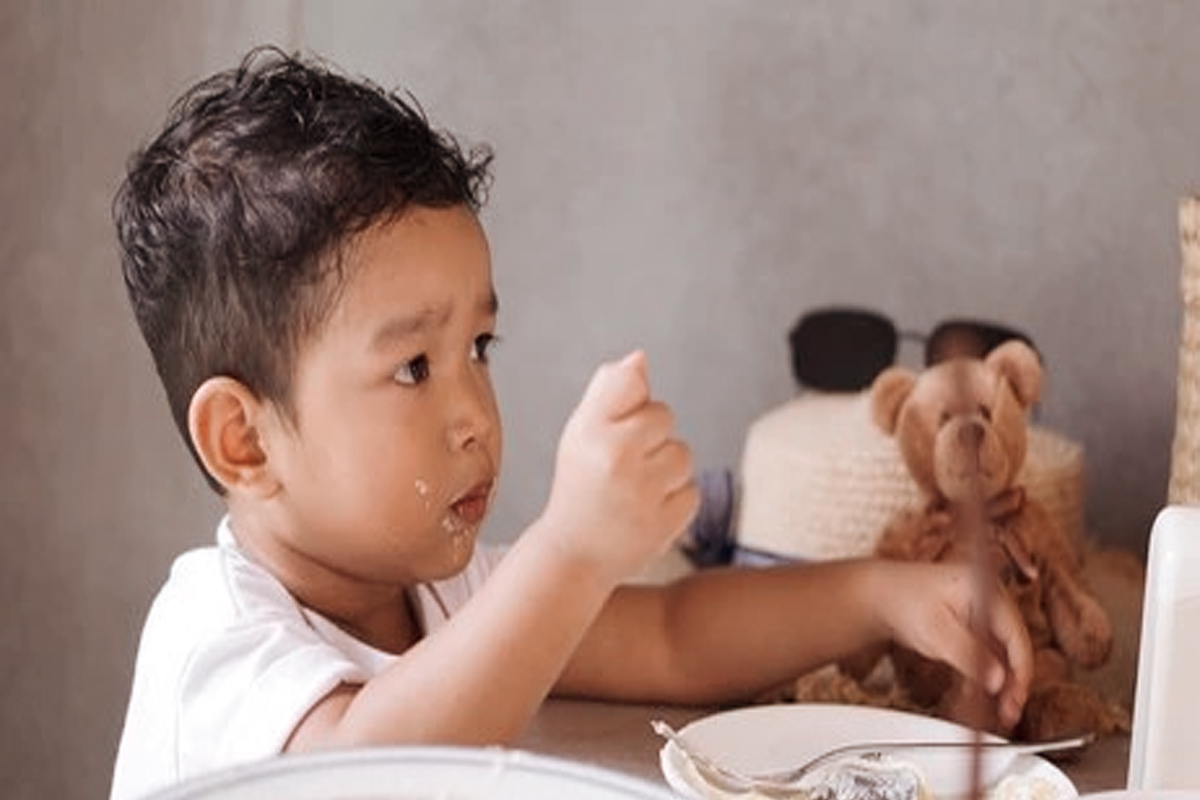In the 23rd month, toddlers exhibit significant developmental strides. Their vocabulary expands, forming basic sentences through engaging conversations. Fine motor skills are enhanced, refining their ability to handle small objects, while improved balance and coordination mark progress in gross motor skills. Socially, toddlers assert independence, expressing preferences and navigating a broader emotional spectrum. Cognitive growth is evident in increased curiosity and imaginative play, coupled with emerging problem-solving skills. Encouraging self-feeding and introducing simple self-care routines fosters autonomy. It’s crucial to recognize individual developmental variations and provide a supportive environment for optimal growth. Regular pediatric check-ups aid in monitoring progress.
Table of Contents
ToggleWhat are the Toddler’s Development and Milestones in the 23rd Month
Language Development
- Expanding Vocabulary. Toddlers typically continue to add more words to their vocabulary, showing a growing ability to communicate.
- Simple Sentences. Some may start forming simple sentences, expressing themselves more coherently.
Motor Skills
- Fine Motor Skills. Improved dexterity allows toddlers to handle smaller objects and attempt activities like stacking blocks.
- Gross Motor Skills. Enhanced balance and coordination contribute to more confident walking, running, and climbing.
Social and Emotional Development
- Increased Independence. Toddlers may demonstrate a desire for independence, wanting to do more things on their own.
- Empathy Emergence: Some toddlers begin to show signs of empathy, understanding, and responding to others’ emotions.
Cognitive Development
- Curiosity and Exploration. Their curiosity continues to drive exploration, and they may show interest in more complex tasks and activities.
- Problem-Solving. Improved problem-solving skills become evident as they engage with puzzles and more challenging play.
Self-Expression
- Artistic Expression. Toddlers may enjoy more sophisticated artistic expression, experimenting with different colors and shapes.
- Verbal Expression. Enhanced language skills enable them to express themselves more clearly and share their thoughts.
Social Interactions
- Play with Peers. Interest in playing with other children grows, fostering social skills like sharing and cooperation.
- Parallel Play. Engaging in parallel play, where they play alongside but not necessarily with others, is common.
Emotional Regulation
- Developing Control. Toddlers work on emotional regulation, learning to manage frustration and express themselves appropriately.
Interest in Stories
- Storytime Enjoyment. Many toddlers develop an interest in listening to stories and enjoying more extended periods of focused attention.
What are the activities needed to Support your 23-month-old toddler’s development
Practical Life Activities
- These activities help promote language development and independence. Examples include brushing teeth, dressing up, and sorting items like clothes pins, measuring cups, and threading kits.
Sensory Play
- Sensory play helps develop your child’s senses and fine motor skills. Activities like puff paint, messy drawing, and painting with sponges can be engaging and educational.
Reading and Phonics
- Reading books and reciting nursery rhymes together can help with language development and cognitive skills
Music and Movement
- Singing simple songs with actions or animal sounds, and engaging in freeze dancing can help with motor coordination and listening skills
Puzzles and Games
- Introduce simple puzzles, card-to-card matching games, and other activities that challenge your child’s problem-solving skills and cognitive abilities
Outdoor Play
- Playing outdoors can help develop your child’s motor skills, coordination, and appreciation for nature
Art and Craft
- Engage your child in simple arts and crafts activities, such as drawing, painting, and making collages, to help develop their creativity and fine motor skills
What are the Mealtimes and Menus for Your 23-Month-Old
Breakfast
- Begin the day with a nutrient-packed breakfast. Options like oatmeal with sliced bananas, whole-grain toast with nut butter, and a small serving of yogurt provide a balanced start.
Lunchtime
- Craft a lunch menu with a mix of protein, vegetables, and carbohydrates. Examples include grilled chicken strips, steamed broccoli, and quinoa or pasta for a well-rounded and satisfying meal.
Snacks
- Opt for wholesome snacks to keep energy levels stable. Consider options like apple slices with cheese, cucumber sticks, or a small handful of whole-grain crackers.
Dinner
- For dinner, offer a variety of flavors and nutrients. Ideas include baked fish with sweet potato wedges, mixed vegetables, and a serving of fruit for a wholesome and delightful meal.
What is the Sleep Schedule of your 23-Month-Old Toddler
Bedtime
- Craft a calming bedtime routine to signal the transition from playtime to sleep. Activities like reading a story, gentle lullabies, or a warm bath can create a soothing atmosphere.
Naptime
- At 23 months, your toddler benefits from one substantial nap, typically lasting 1-2 hours, and around 11-14 hours of nighttime sleep. Ensure the nap occurs earlier in the day to avoid interfering with nighttime sleep.
Choosing the Right Bedtime
- Determine an appropriate bedtime, usually between 7:00 PM and 8:00 PM, to synchronize with your toddler’s circadian rhythm. Consistency in bedtime supports the development of a healthy sleep-wake cycle.
Day in the Life of a 23-Month-Old Toddler
Eating
- 3 meals and 2 snacks per day
- Offer a variety of healthy foods from all major food groups, including proteins, whole grains, vegetables, fruit, and dairy products
Sleeping
- Typically sleeps around 11-12 hours at night
- 1-2 hour nap during the day
- It’s also common for toddlers of this age to experience the 2-year-old sleep regression
Developmental Activities
- Climbing up and down stairs. Allow your toddler to practice walking up and down stairs with your supervision to build their motor skills
- Tricycle or balance bike. Introduce a trike, bike, or scooter built for a 2-year-old to help your child develop their pedaling and balancing skill
- Talking and listening. Engage in conversations with your toddler, even if the conversations are one-sided, to help develop their language skills
Fun Facts
- They start to show better hand and finger skills, such as picking things up without looking at them
Toddler’s Health at 23-Month-Old
Hydration
- Provide water throughout the day to keep your toddler well-hydrated.
- Limit the consumption of sugary drinks and encourage healthy beverage choices.
Safety Measures
- Supervise playtime to ensure a safe environment, especially when playing outdoors.
Immunizations
- Stay updated on your toddler’s immunization schedule as recommended by your healthcare provider.
- Discuss any concerns or questions about vaccines with your pediatrician.
Dental Care
- Introduce regular dental hygiene habits, including brushing your toddler’s teeth twice a day.
- Schedule a first dental check-up with a pediatric dentist.
Behavior and Socialization
- Encourage positive social interactions with other children through playdates or group activities.
- Address any behavioral concerns with consistent and age-appropriate discipline.
Screen Time Limits
- Limit screen time and ensure that any screen activities are age-appropriate.
- Engage in interactive activities, such as reading or playing, to promote healthy development.
Communication with Healthcare Provider
- Schedule regular well-child check-ups with your pediatrician.
- Communicate any health or developmental concerns promptly.
Development Tips for Your Toddler This Month
Promote Independence
- Allow your toddler to participate in simple tasks, such as dressing themselves or choosing snacks.
- Foster a sense of autonomy by offering choices whenever possible.
Support Motor Skills
- Provide opportunities for both fine and gross motor skill development through activities like drawing, stacking blocks, and active play.
- Offer safe and age-appropriate toys that encourage physical movement.
Cultivate Social Skills
- Arrange playdates or social activities to promote interaction with other children.
- Encourage sharing and taking turns during playtime.
Immerse in Imaginative Play
- Foster creativity by engaging in imaginative play scenarios, such as pretending to cook or playing with toy animals.
- Provide props and toys that stimulate the imagination.
Encourage Emotional Expression
- Validate and acknowledge your toddler’s emotions, helping them understand and express feelings.
- Teach simple ways to cope with emotions, such as taking deep breaths.
Items Needed on the 23rd Month of Your Toddler
Nutrient-Rich Snacks
- Opt for healthy snacks to support your toddler’s growth and development.
Educational Toys
- Stimulate learning with age-appropriate toys that encourage cognitive development.
Comfortable Clothing
- Check if your toddler has enough weather-appropriate and comfortable clothing.
Childproofing Supplies
- Reassess safety measures and update childproofing to keep your toddler secure.
Interactive Books
- Foster a love for reading with engaging and interactive books suitable for their age.
Hygiene Essentials
- Stock up on diapers, wipes, and other hygiene products to keep your toddler clean and comfortable.
Routine Health Check
- Schedule a regular check-up with the pediatrician to monitor your toddler’s health and growth.
Playdate Essentials
- Plan for playdates by having some easy-to-share toys and snacks available.
Life as a Parent on Toddler’s 23rd Month
Language Leaps
- Witness the blossoming of language skills as your toddler starts expressing themselves more clearly and engaging in simple conversations.
Boundless Energy
- Brace yourself for the continued surge of energy. Your toddler is likely to be on the move, exploring the world with newfound vigor.
Independence Unleashed
- Embrace their growing independence. From attempting to dress themselves to asserting preferences, your toddler is becoming more self-reliant.
Social Butterfly Emerging
- Notice an increased interest in social interactions. Playdates become more dynamic as your toddler engages with peers and explores the joy of shared activities.
Curiosity and Questions
- Be prepared for a barrage of “why” questions. Curiosity is thriving, and your toddler’s inquisitive nature is a sign of their expanding understanding of the world.
Artistic Explorations
- Enjoy the creative expressions of your toddler. Artistic endeavors become more intentional, and you may find joy in their colorful masterpieces.
Potty Training Progress
- If you’ve started potty training, observe progress. Your toddler may show signs of readiness, and this milestone marks a step toward increased independence.
Emotional Rollercoaster
- Navigate the emotional rollercoaster. Toddlers are still learning to regulate their emotions, and you may witness a mix of joy, frustration, and curiosity.
Parenting Teamwork
- Strengthen the parenting teamwork. As your toddler becomes more active and independent, coordinating with your partner becomes crucial in maintaining a harmonious household.
Checklist needed for the 23rd Month
Toys and games
- Provide toys and games that help develop fine motor skills, such as puzzles, drawing, stacking blocks, and stringing chunky beads. Matching games can also help with shape and number recognition
Physical activities
- Encourage walking, running, and jumping to help develop motor skills. Activities like “Let’s try not to step on the cracks” can help keep your toddler on their feet.
Speech
- Encourage your toddler’s speech development by exposing them to new words and simple phrases. They may be able to answer simple questions, such as “What’s that animal?”
Safety
- Childproof your home to prevent household accidents, such as falling down the stairs or accessing dangerous items
Party planning
- Start planning your child’s second birthday party and send out invitations
Last Updated on January 15, 2024
Written By
With a solid foundation in family dynamics, child development, and a knack for assessing products, our content is built on a strong grasp of our topics. We use trustworthy sources, seek advice from experts, and stay current with the latest happenings in our fields. We always give credit to our sources, reveal any possible conflicts of interest, and deliver info in a truthful and unbiased way. Follow us on Facebook or join our Facebook Group.
Start your journey to confident parenting
Join over 2,000+ parents who receive free practical advice and tips from Joyful PH. Unsubscribe anytime.
You may also like
Toddler’s Development and Milestones at 24th Month
A two-year-old's growth and achievements at 24 months are remarkable. Toddlers…
Toddler’s Development and Milestones at 22nd Month
At 22 months, toddlers make strides in independence, speech, and motor skills.…
Toddler’s Development and Milestones at 21st Month
During the 21st month, toddlers continue their dynamic development. Language…
Toddler’s Development and Milestones at 20th Month
At 20 months, toddlers exhibit remarkable progress. Their language skills…
Toddler’s Development and Milestones at 19th Month
A toddler at 19 months undergoes significant development. Language skills…
Toddler’s Development and Milestones at 18th Month
As your toddler ventures into the realm of the 18th month, a myriad of…







